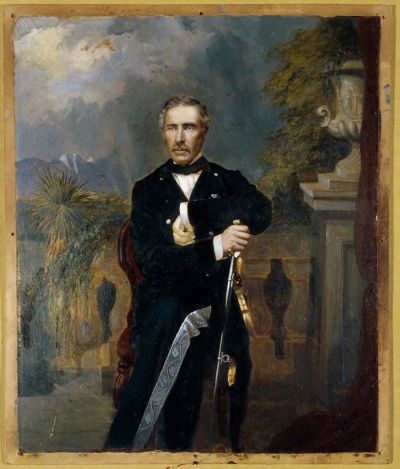Events In History
-
 3 December 1863Land confiscation law passed
3 December 1863Land confiscation law passedThis law allowed for the confiscation (raupatu) of Māori land to punish North Island tribes which were deemed to have rebelled against the British Crown in the early 1860s. Pākehā settlers would occupy the confiscated land. Read more...
Articles
The Treaty in practice

Amalgamating Māori into colonial settler society was a key part of British policy in New Zealand after 1840. Economic and social change, along with land-purchase programmes, were central to this process.
- Page 2 - Slide to warWar raged in the North Island in the mid-19th century. The period from 1860, when conflict broke out in Taranaki, through to about 1872, is commonly called the New Zealand Wars.
Treaty timeline

See some of the key events between 1800 and 1849 relating to the Treaty of Waitangi.
- Page 2 - Treaty events 1850-99See the key events between 1850 and 1899 relating to the Treaty of
Pai Marire

Pai Marire (goodness and peace) was one of several Maori Christian faiths to emerge in the 19th century. Like many others, it was closely tied to issues of land and politics.
-
Page 3 – The death of Carl Völkner
The ritual killing by Pai Mārire followers of missionary Carl Völkner in 1865 shocked many people. The government used the event as a reason to take harsh action against Pai
Māori King movement - 1860-94

King Tāwhiao's reign was dominated by the Waikato War and its fallout.
-
Page 5 – Maintaining Te Kīngitanga
By the early 1870s, the Kīngitanga was struggling. Living conditions within the Rohe Potae (the Māori King's territory) were poor. Allies such as Ngāti Hauā had begun selling
The Vogel era

In 1870, Colonial Treasurer Julius Vogel launched the most ambitious development programme in New Zealand’s history. The ‘Vogel era’ was a decisive moment in New Zealand’s 19th-century transformation from a Māori world to a Pākehā one.
- Page 4 - Building Vogel's railwaysJulius Vogel wasn’t the first colonial politician to promise public works and immigration on the back of borrowed money. But the early 1870s offered better prospects for
Biographies
-
 Whitaker, Frederick
Whitaker, Frederick
Despite Frederick Whitaker’s advanced views on electoral reform, this two-time premier tarnished his reputation by land speculation and confiscation.
Read more...
Related keywords
- railways
- julius vogel
- economy
- immigration
- communications
- public works
- telegraph
- assisted immigration
- provinces
- maori land
- pai marire
- te ua haumene
- new zealand wars
- religion
- christianity
- moutoa gardens
- race relations
- george grey
- alfred domett
- premiers
- frederick whitaker
- legislative council
- missionaries
- opotiki
- carl völkner
- kereopa te rau
- mary aubert
- maori leaders
- kingitanga
- tukaroto potatau matutaera tawhiao
- king country
- treaty of waitangi
- waikato wars
- governor
- painting
- northern war
- land claims
- maori land court
- timeline
- te kooti
- riwha titokowaru
- parihaka attack
-
Main image: George Grey
Captain George (later Sir George) Grey was New Zealand's most complex governor. He was governor, governor-in-chief and then governor again, serving from 1845 to 1853 and again from 1861 to 1868.


